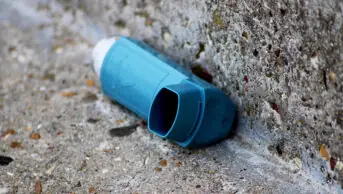
Shutterstock.com
Health boards and NHS organisations in Wales can now claim a share of a £2.4m pot from the Welsh government for projects that will help the NHS reduce its carbon emissions, it has announced.
In a statement published on 29 April 2022, the government said that NHS organisations will be able to claim up to £60,000 each to fund initiatives that will “deliver towards the ambition for the Welsh Public Sector to be collectively net zero by 2030”.
NHS organisations have until 9 June 2022 to submit applications for funding for projects or posts that support behavioural change or reduce greenhouse gas emissions.
In March 2021, NHS Wales published its ‘Decarbonisation Strategic Delivery Plan 2021–2030’, which set out 46 targets for delivery by 2025, including a target to “shift to 80% of inhalers being low global warming potential (GWP) alternatives”.
According to the document, metered dose inhalers (MDIs), which contain hydrofluorocarbons — a greenhouse gas “with a global warming effect several thousand times that of carbon dioxide” — accounted for 70% of all inhalers in the UK in 2017.
“NHS Wales aims to reduce the carbon impact of inhaler use through the development of careful and considerate guidance for pharmacists and prescribers, to allow them to identify high GWP inhalers and consider less polluting alternatives where medically suitable,” the document said.
The plan advised clinicians to “proceed with transitioning patients to low GWP inhalers (e.g. dry powdered inhalers [DPIs]), but only where patient care will not be impacted”.
“Where a transition to a low GWP inhaler is not possible … patients’ treatments should not be changed.
“Low-GWP metered dose inhalers (MDIs) are expected by 2025 and a shift to a different type of inhaler should be revisited when these inhalers become available,” the document added.
While the Welsh government committed £16m in ring-fenced funding in 2021/2022, it told The Pharmaceutical Journal on 4 May 2022: “There is no separate ring-fenced allocation in 2022/2023 for decarbonisation … the £2.4m is separate funding for projects to reduce climate emissions.”
The target to switch more patients to DPIs in Wales came ahead of plans to reduce prescribing of MDIs in England to 25% of all non-salbutamol inhalers by 2023/2024.
Judith Paget, chief executive of NHS Wales, said: “As the largest public sector emitter of CO2, the NHS in Wales needs to play its part to protect the health and wellbeing of future generations.
“We can all help with this effort by returning unused medication to their pharmacy, asking for a more sustainable inhaler or using active or public transport to attend appointments.
“We are also encouraging applications from NHS Organisations for up to £60,000 in the first year for small-to-medium-sized initiatives to reduce carbon emissions or help the sector adapt to the impacts of climate change.”


